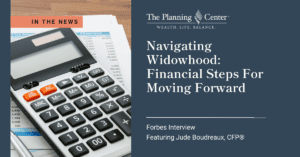by Jude Boudreaux, CFP®, Sr. Financial Planner

Why buy bonds?
Recently, our clients have been asking the excellent question of why we’re still investing in bonds with yields so low. The Covid-19 pandemic has caused a lot of upheaval in international markets but bonds by their very nature, remain stable. I’ve provided a few reasons why buying bonds makes sense and why they are still an essential part of nearly every investor portfolio:
Diversification
We believe that owning a low-cost well-diversified portfolio is the best way to get most investors to their financial goals. A portfolio that doesn’t include any bonds would be extremely volatile and the sharp downturns often offset the possible benefits of having a more supercharged portfolio. A more aggressive portfolio can lead to more negative outcomes versus a portfolio balanced with bonds. An aggressive stock portfolio also brings more danger as we plan for retirement and often the risk of sharp and fast losses just isn’t worth the possible additional returns. Alternatively, bonds remain a good diversification tool to balance the growth and volatility that stocks can bring.
Rebalancing
At The Planning Center we use two rebalancing systems:
- Market Pricing Adjustment that measures long-term stock valuations
- Opportunistic Rebalancing system that will rebalance portfolios based on shorter-term market volatility.
The oldest market wisdom suggests that we ‘buy low, sell high’ and rebalancing is a mechanism that attempts to make that work. By owning bonds, we own stable investments that provide the ability to hedge against market downturns by taking profits when stocks are doing well, and by selling bonds to buy stocks when stock markets turn south.
Withdrawals for spending
If you need to make withdrawals during a market downturn, the stable nature of bonds helps to preserve their value. If you have an urgent need for cash, bonds can often be sold which can allow the stock portions of your portfolio to recover before selling.
Limited alternatives
If the goal is to provide more stable values than stock investments, with very high liquidity and low barriers and costs to trading, there isn’t a great alternative to bonds. High-yield savings accounts can provide additional return over bonds in the short term, but those rates have been falling for months and will likely continue as the Federal Reserve has signaled, they will maintain near-zero short-term interest rates.
For some bonds: tax advantages
Municipal bonds issued by state and local governments have favorable tax treatment when owned in taxable investment accounts. For some investors in higher tax brackets, the federal income tax free nature of those bonds can provide more yield than federal government or corporate bonds.
If you would like to enquire about adding bonds to your portfolio, please ask your TPC planner!

Jude Boudreaux, CFP®, is a Partner/Sr. Financial Planner in the Chicago and New Orleans offices of The Planning Center, a fee-only financial planning and wealth management firm. Email him at jude@theplanningcenter.com.





